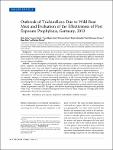Outbreak of Trichinellosis Due to Wild Boar Meat and Evaluation of the Effectiveness of Post Exposure Prophylaxis, Germany, 2013
Faber, Mirko
Schink, Susanne
Mayer-Scholl, Anne
Ziesch, Christoph
Schönfelder, Ralph
Wichmann-Schauer, Heidi
Stark, Klaus
Nöckler, Karsten
Background: Food safety authorities discovered that wild boar meat products contaminated with Trichinella spiralis had entered the food chain in Germany in March 2013. Public health authorities issued guidelines for health professionals including post-exposure prophylaxis (PEP) using mebendazole and advised the public to seek medical advice if exposed. Our objective was to identify factors associated with the development of trichinellosis and to evaluate post exposure prophylaxis. Methods: Persons who reported to local public health departments as exposed were interviewed concerning exposure, symptoms, and medication. Serum samples were tested by an in-house Trichinella-specific enzyme-linked innunosorbent assay. Cases were defined as persons presenting with myalgia and/or periorbital edema and Trichinella-specific immunoglobulin M and immunoglobulin G antibodies after exposure to implicated products. Results: Of 101 persons interviewed, 71 were exposed and serologically tested. Antibodies were detected in 21/71 (30%) and 14/71 (20%) met the case definition. Attack rates were positively correlated to the amount of implicated product consumed. Among n = 37 persons who received anthelmintics as PEP, 6 persons developed trichinellosis. These cases exclusively occurred among persons starting PEP 6 days or later post-exposure. Exposure to implicated products and delaying PEP were also significantly associated with developing trichinellosis (P < .01) in a multivariable analysis. Conclusions: Concerted efforts by food safety and public health authorities lead to timely outbreak control and facilitated the provision of early PEP. PEP appears to be effective in preventing trichinellosis when given early, preferably within 6 days. We therefore recommend initiating PEP without delay in similar settings and encourage public health professionals to fast-track this intervention.
Dateien zu dieser Publikation
Keine Lizenzangabe

